
Quick, low budget trip to Paris
Two actresses, a director, and a member of a film crew all converge in Paris, France for the lighthearted film, Cine Café in Paris. This was a low budget film with Kim Changgyun wearing the hats of actor, director, writer, producer, director of photography, and editor. Whew! It felt like a family affair as everyone in the small cast with the exception of one was a Kim. This was a nice travelogue of Paris and also an “inside baseball” look at filming abroad.Hara and Eun Su are two actress friends vacationing in the City of Lights. Hara is getting over a failed relationship and audition. The two women take in the sights and discuss boyfriends and life. All is going well until Hara accidentally loses Eun Su’s beloved camera. About that time Director Shin and Mr. Lee make their acquaintance and the four seem to run into each other continually in the quaint little town of Paris where throngs of crowds are unknown. Lol
Hara and Eun Su approach the tourist sights differently. Eun Su takes pictures of art and the buildings around her, while Hara focuses on selfies. Both are dedicated to being actresses though they don’t seem to have much success yet. Shin and Lee discuss the difficulties of filming abroad as they scout locations for his next film. When Shin tells Lee that the production company has to field all of the complaints of the crew and cast, even about the food that’s served, Lee responds Mr. Kim handles all that. A nod of course to the director of this film.
There were times this movie felt like it was filmed with a cell phone, and with a low budget, it might have been. There were only a few scenes where music was inserted and it came across like old silent films because there was no dialogue when the music played. There were also placards introducing each new chapter with the setup for that part of the story, much like silent films as well.
If you want to see the main sights of Paris, this film touched briefly on them. The Louvre, Eiffel Tower, Notre Dame (pre-fire), Montmartre, a cruise down the Seine, and other familiar places were shown. The director commented in the movie that filming near these tourist attractions required permission and that there wasn’t much one could do about the large crowds, so it appeared they tried to work around those limitations in real life.
Cine Café in Paris wasn’t a great film, and it did start out too slow and self-conscious for me, but as the women worked through their problems and the men joined in with the discussions it became more engaging. Director Shin actually answered some of the questions I had about filming in Paris during his conversations with Lee. At around an hour, it didn’t require a huge time commitment to pop over to Paris and enjoy some of the sights and see how the four people overcame their personal and professional challenges.
22 May 2024
Was this review helpful to you?

"A decade, is that a long time or no time at all?"
Going into The Last 10 Years there was no denying what type of movie I would be watching-a story about a young woman with a terminal illness based on a true story. But as with any genre, it’s how the story is implemented as to whether it touches you or not. The moment the director cues the violins and tries to manipulate my feelings, I tend to dig in and become resentful. This film was quite the opposite. While the music was emotional and lovely, the story slowly unfolded allowing the characters to make their way through decisions about life, death, relationships, and whatever the future means.When Matsuri is in the hospital she is given a camcorder by a dying mother and admonished to, “Live every minute to the fullest.” That advice is hard to follow after she returns home and boredom overtakes her. Diagnosed with Pulmonary Arterial Hypertension her list of restrictions and medications is quite long. She goes to a middle school class reunion where no one knows about her illness and reconnects with old friends. The standard questions arise about marriage, children, and work. Kazuto, a boy she doesn’t remember, attempts to reach out to her. Kazuto has his own issues with life and death and before long, he, his friend Takeru, Matsuri and her editor friend, Sanae, begin to hang out. In the dark about her illness, Kazuto is clearly smitten but Matsuri has her daily grind with avoiding death to deal with as well as her loving but concerned family.
Matsuri and Kazuto both had their issues with life’s disappointments and whether death would be a tragedy or a gift. As they grew closer, both began to embrace life more. For Kazuto, the future held promise and an unknown amount of time. For Matsuri, tomorrow was always in question knowing her time was imminently finite. No one gets out of this life alive, but for Matsuri, that harsh reality faced her every day. I was happy there was no countdown clock as if the 10 years prognosis was ironclad. The median life expectancy for someone with PAH is 5 years. Each crisis she faced could have been her last. The film didn’t throw roadblocks into her relationship with Kazuto just for the standard effect. Matsuri not only had to take Kazuto’s feelings into consideration but her own as well. She did what she needed to do to be strong enough to face death.
Komatsu Nana gave a beautifully nuanced performance as Matsuri. Layers of emotions peeled forward and back as she portrayed Matsuri dealing with her day-to-day struggles with Death hanging over her shoulder. Ever aware of her parents’ pain, she put a mask on for them most of the time and for her friends. When the dam finally broke and her fears and disappointments rolled over her, Komatsu’s performance was raw and real. Ever cautious with Kazuto so as not to get too close, but staying close enough to bask in his warmth, you could feel the walls she kept carefully erected. And finally, as Matsuri’s body began to collapse, the slow acknowledgement of a clock ticking down.
Far from being maudlin, The Last 10 Years was an exercise in living well and making the most of life regardless of circumstances. Whatever Matsuri gained-a relationship, a job, a friendship, she was always aware how close she was to losing them. Yet she still found the strength to try. She was searching for meaning and just the simple experiences of living. I was here. I lived. I loved. And in her strength, she gave Kazuto a love for life as well.
“My life might look like just another boring existence but you’ll always be with me.”
16 May 2024
Was this review helpful to you?

"Times change, so do we"
Juhan Shuttai turned Vibes’ publishing world on its head with the addition of a force of nature to a manga editing department in the form of Kurasawa Kokoro, a former judo star. Surrounded by men day and night, Kokoro used her training to learn the ropes and forge professional relationships with the oddball crew of writers and editors.After an injury causes Kurosawa Kokoro’s judo career to end she decides to work in manga editing. Twenty interviews later she lands a job at the manga magazine Vibes, the #2 magazine. Before long she is training with the rational Iokibe and butting heads with the cynical Yasui. She meets a successful senior manga creator who is struggling with his artwork and an eccentric hat wearing writer whose volatile love life threatens deadlines. Kokoro cheerfully helps to come up with solutions to the deadline and creative problems. Her mantra is always “Do your best!” Now she needs to develop her own writers and fulfill her desire to publish a sleeper hit.
This was a strange world where most women, aside from Kokoro and a couple of others, lived on the periphery. Most of the work was about the men. Kokoro seemed to be hired because she was an unorthodox woman. In real life she would be exhausting to be around. She stayed aerobically fit by running, always taking the stairs and talking so loudly, so enthusiastically, and so fast she often gasped for air. She lived in a world inhabited by mostly men. I come from a place where the majority of publishing editors are women so seeing the editing and sales departments with zero women except for Kokoro was staggering. Management was entirely male. Only one of the ten manga writers was a woman which was interesting given that 66-70% of mangaka are female. And the sole female artist was repeatedly said to have “hangups” and was only there to be taken advantage of. None of the eight manga assistants were women. The invisibility of women made it all the more visible they weren’t there when they should have been, at least as artists.
Juhan Shuttai discussed the changing environment for mangas, how e-books and closing bookstores affected the business. Lower sales caused the bottom line to be critical for the triumvirate of manga artists, publishers, and booksellers to all stay in the black. The editors and booksellers fought to keep manga relevant and selling in an ever changing market.
The problems that arose weren’t earth shattering and usually had simple solutions that fixed everything. This was a joyful, carefree watch where good actions and positive thinking were stressed. Luck could be accrued by acts of kindness and most characters learned lessons about life and happiness. If you are down and need something encouraging this would be a good choice. Despite me wanting to find the volume button to turn down Kokoro’s unrelenting enthusiasm at times, it was a nice “pick me up” drama to watch.
12 May 2024
(7.75)
Was this review helpful to you?

"I became a gangster because of a chicken leg"
Director Doze Niu set Monga in the 1980’s replete with terrible hairstyles and requisite Air Supply music. The five boys of the Gang of Princes had enough daddy issues to ask for a group rate at their local therapist’s office. The boys also dealt with the daily violence on the streets, betrayals, death, and unrequited love.Mosquito’s father died after he was born and he’s been bullied everywhere he and his mother have lived. The bullying begins again at his new school over the chicken leg in his lunch. After school, Dog Boy and his crew jump Mosquito but the new kid acquits himself well and the real power gang led by Dragon Lee and Monk take notice and take Mosquito under their wing. While Dragon Lee is the leader due to his dad’s gang status, Monk, his second in command, provides the muscle and the brains. The boys become sworn brothers and spend more time together hanging out than in school. Life can be precarious on the streets as the brotherhood find out after a deadly mistake has repercussions, a secret touches the wrong ears, and a new player comes to town unafraid to shake up the old way of doing business.
Triads, gangs, and boys’ gangs have all been done. Doze put his own Taiwanese flair on Monga. The crowded, brightly lit streets deserved their own screen credits. The scenes were as loud and chaotic as the story. While there were plenty of fights, they often came across more balletic, especially with the soothing music playing in the background and slow-motion shots. Monk and Mosquito were the focus of the main plot and subplots. Monk’s feelings for Dragon Lee ran far deeper than brotherhood. He protected Dragon Lee from his own worst inclinations and took the punishment for his actions from Dragon’s gang boss dad. Monk also had his own aspirations and deeply held resentments. Mosquito was the innocent one of the crew. He was looking for family, for brothers, for connection---for a father. Much of the narration was told through his naïve eyes. Perhaps to bring a feminine element into the film or to give Mosquito a soft shoulder to lie on, Ning, a prostitute was introduced. Around the same age, the two fell into a tender friendship, limited by her contract at the brothel. Doze played the Mainland triad leader determined to take over Monga and who also had a connection to Mosquito and his mom.
Mark Chao in his film debut provided the character who could show horror and fear when called upon for the audience. At times a little stiff, but overall, a good first film performance. Ethan Juan was both mesmerizing and terrifying as Monk. With good reason he won the Golden Horse Award for Best Leading Actor for his primal portrayal of the young gangster. Rhydian Vaughan didn’t have as much to do, although he was saddled with the worst mullet outside of a redneck truck stop in 1980’s Texas. The veteran cast gave the proper gravitas to the criminal adults in the room.
The first half of the frenetic movie was all about bonding and hanging out, and navigating the different groups and their territories. When there was no turning back, the shift in tone was cataclysmic and there was no denying that blood would be shed, and vows would be broken. When war came to Monga, no one was ready for the consequences, not even those who thought they were above it. Blood would flow like cherry blossoms.
10 May 2024
Was this review helpful to you?
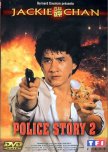
Didn't blow me away
Police Story 2 brought back much of the cast from Police Story, including the divine Maggie Cheung. Even with two different sets of bad guys and some pyrotechnics, the story dragged badly in comparison to the first and third movies of the series.Chan Ka Kui finds himself demoted to traffic cop after the destructive events of the first film. To make matters worse Chu Tao is given a compassionate care release. Chu's assistant Koo and his henchmen harass both Chan and May repeatedly. After a run in with the baddies in a restaurant and a children’s playground, Chan is called on the carpet by his bosses. This time he’s had enough and resigns. He no more than turns his badge in when blackmailing bombers threaten a company by blowing up one of their malls. His superiors talk him into coming back to work and he joins an elite surveillance team to track down the evil doers.
PS2 struggled with its identity. The murderous bad guys from the previous film were played up for comic effect in this one. Honestly, most of the scenes committed to Charlie Cho’s Koo felt more like padding and did nothing to drive the narrative forward. At 2 hours, the movie was already bloated for a 1980’s action flick. While there were a couple of good fights as was expected from a Jackie Chan movie, there wasn't the same excitement as in PS1 and 3. Given the outtakes, several people were hurt including Maggie Cheung. She endured a serious head injury, serious enough she couldn’t finish the film which was obvious because after the stunt you never see her face again. Much of Chan’s stunts in the last thirty minutes involved being set on fire. There were two impressive explosions but buildings blowing up don’t make up for terrible pacing and lackluster storytelling.
There were several interesting guest appearances. Wu Ma showed up as a mall cop. Lau Ching Wan made a brief showing as a CID officer. Charlie Cho’s main reason for being in the film seemed to be for the comic effect of having his glasses invariably broken in all of his scenes, a running gag from the first movie. Benny Lai was one of the official stuntmen from Jackie’s company and provided a sound final opponent for Chan even if his deaf-mute character pushed the limits of poor taste. Mitsubishi trucks and Canon cameras had more scenes than most of the supporting actors. Full moon alert---some of the bit players appeared to have been hired for their tight butts for a comic scene when May chased Chan through the men’s police showers.
While there were entertaining fights and moments, especially in the last thirty minutes, Police Story 2 bogged down for much of the other ninety minutes going back and forth trying to decide if Chan was a loose, reckless canon or a hero. I’m sure many Jackie Chan fans will find this film a blast. But for me, instead of a thrilling, explosive story, the bouncing around of villains and bland dialogue caused the movie to fizzle.
4 May 2024
Was this review helpful to you?
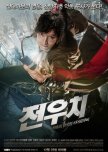
"The world has changed." "But people don't change"
Jeon Woo Chi: The Taoist Wizard was an uneven but entertaining movie about a mischievous Taoist sorcerer who battled monsters in 16th century Korea and 500 years later. A magical flute that can control the monsters was at the center of a battle between good and evil as Woo Chi and his trusty sidekick Cho Rang Yi attempted to put the monsters back in their gourds.Woo Chi enjoys bringing attention to himself even when he’s doing it for a good cause and also likes tweaking the noses of the rich and powerful. Armed with magical talismans he performs amazing tricks all of which are frowned upon by his master and sidekick. Rang Yi appears human but in actuality is a dog who can also take the form of a horse. One night Woo Chi crosses paths with another Taoist master, Hwa Dam, and three bumbling shinsuns. These shinsuns are the immortals who accidentally released monsters imprisoned in a heavenly realm by losing track of time while Pyohundaeduck played his magical flute keeping them under control. When the monsters escaped, the flute was contaminated with evil spirits. Both it and Pyohundaeduck fell to earth. The flautist lost his memory and disappeared. Hwa Dam and the shinsuns are searching for the flute. Woo Chi in on the hunt for a bronze sword that will help him become more powerful. After Woo Chi’s master is murdered Hwa Dam and the shinsuns blame Woo Chi and lock him into a painting along with Rang Yi and half of the broken flute. 500 years later the shinsuns release Woo Chi when Hwa Dam is unavailable to fight two dangerous escaped monsters.
Kang Don Won was entertaining as the cocky sorcerer, without his charisma this film would have fallen flat. Yoo Hae Jin is a pleasure to watch and always brings his all to every role even when playing animals. Kim Yoon Seok gave a delightful menace to Hwa Dam. And three competent character actors took on the Three Stooges of heavenly beings. Despite being the FL, Lim Soo Jung wasn’t given much to do until the end.
There was plenty of action both magical and down and dirty fighting between Woo Chi and the monstrous rat and rabbit and their human forms. Wire work abounded and Woo Chi sustained hits even a sorcerer shouldn’t have gotten up from. The CGI was rudimentary more often than not, even for 2009. I didn’t have a big problem with the mediocre CGI but I did have a problem with the editing and lapses in narrative. Some of the story was needlessly confusing and contrived. The actors and action managed to smooth over the ragged seams most of the time.
Though a romance was awkwardly inserted, it didn’t work well for me. This was more a story of a sorcerer and his dog. While Jeon Woo Chi was a lighthearted magical romp, its failure to tie several narrative elements together kept it from casting a spell over me.
3 May 2024
(7.25)
Was this review helpful to you?
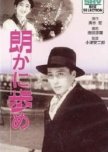
"I may be a bad man but I can be sincere"
Walk Cheerfully was the second of Ozu Yasujiro’s crime films from the 1930’s. Before he endlessly contemplated how modernization affected the traditional family, he directed this film about a gangster who fell in love with a good woman and turned his life upside-down.Kenji the Knife and his crime buddy Senko work together to steal wallets and blackmail people. Kenji is involved with a hard-hearted dame named Chieko. One day he sees a beautiful woman picking up a diamond ring in a store. As fate would have it afterwards, he almost literally runs into her and her sister in his car and gives them a lift. From then on he is completely smitten with Yasue while his friends think he is playing her for her money. Yasue has her own problems at work as a typist due to a pervy boss who thinks she would jump at the chance to be with him. Her mother advises against her quitting as she is the sole breadwinner in their little family. Kenji and Yasue begin to see each other until Chieko tells her what he does for a living. Kenji has to decide if he loves Yasue enough to go the straight and narrow for her.
This early Ozu film would be hard to peg as one of his. The simplest reason was that he was not the screenwriter for this film as he was for his more famous films. His directorial style was unlike his post WWII films, too. There was a great deal of movement as he hadn’t solidified his filming from the mat style. He was still in his filming feet stage as there were at least three scenes with people’s shoes. While each frame was well composed the sets reflected Kenji’s grittier lifestyle in lieu of the picturesque compositions he would use later. People talked more naturally instead of staring head on toward the camera. There were still the geometrically inspired shots and loving attention to everyday objects. This film had a light comedic touch often shown through the gangsters walking and dancing in sync.
I enjoyed this film more than Dragnet Girl which revolved around a gangster falling in love with a good traditional woman, too. Like that film, Yasue wore traditional clothes and the gangster moll wore western attire. Takada Minoru was suave as the gangster wooing Kawasaki Hiroko’s Yasue. Yoshitani Hisao as Kenji’s friend Senko had a comfortable chemistry with Takada. The buddies supported each other in their life new goals while a third crime partner as well as the moll couldn’t let go of the criminal way of life or Kenji. Sakamoto Takeshi who appeared in several Ozu films through the years portrayed Yasue’s lecherous boss.
For a silent film, Walk Cheerfully was an easy watch as the story was straightforward. A bad boy falls in love with a good girl. He changes his way of life for her and must decide when things get tough whether to fall back into his old ways. The intertitles made the story comprehensible and the actors gave thoughtful performances that clearly showed their emotions without overacting. While there were a few slow areas, overall the film was an enjoyable watch.
28 April 2024
Was this review helpful to you?

"Big stories, like life, get out of control"
Gone with the Bullets was loosely inspired by the real-life events that led to China’s first film. I say loosely because very little in this film was realistic from the opium induced car ride in the sky to the cartoon reenactments of a supposed crime scene. A kaleidoscope of primary colors doused the screen in a variety of manners. The realistic elements were the dangers of the court of public opinion and how films could be utilized for propaganda.Ma Zouri is a fixer and a con artist extraordinaire. When the 7th son of the local warlord comes to him for help, Ma smells an easy mark. He and his partner, Xiang Feitian, decide to use Wu Qi’s money to hold the largest courtesan contest in the world, open to all ladies of the evening. The pageant is shared over the radio and filmed by the warlord’s 6th child, Wu Liu. The beautiful Yin Wanyan, and Ma’s lover, wins after promising 30 men she will entertain them and let them discover her “virginity.” The newly crowned President asks Ma to marry her which he refuses. They go on an opium induced car ride after making up. The next morning Ma wakes to find the car turned over and Wanyan dead. He runs to Wu Liu for help as he’s wanted for murder. During his two years on the run, he discovers there is a lurid play based on Wanyan’s death with audience participation.
"When the fake becomes real the real often becomes fake"
The film opened to music from 2001: A Space Odyssey, quotes from Shakespeare’s Hamlet, and an homage to the Godfather. It didn’t stop there. Numerous movies, events and songs were used regardless of time and circumstance. One contestant sang Summertime by Gershwin which wouldn’t be written for another decade when it was used in Porgy and Bess. The ode to motherhood also looked suspiciously like something out of 42nd Street. Reality and memory blended at times making it hard to tell what was real.
"We have to go fast to be nowhere"
Director Jiang Wen also starred as Ma Zouri with the capable Ge You as the duplicitous Xiang. An ethereal Shu Qi brought Wanyan to life and Jiang’s wife, Zhou Yun, was marvelous as Wu-6th aka Wu Liu. No expense was spared on the opulent sets and luxurious costumes. The talent portion of the contest was filmed on a huge stage with numerous scantily clad dancers in well choreographed dance numbers. I was surprised to see so much skin and gratuitous crotch shots in a Chinese film. Even more surprised in a fan dance number filmed from above where the dancers’ fans provocatively looked like vaginas. There were also poop jokes, self pleasuring, and a prisoner threatened with being “hammered” by a horse.
“The audience is always right.”
The story wasn’t always cohesive in this allegory or spoof of the movie industry and lawless land governed by corrupt foreign entities and warlords. “Love is nice but violence makes money!” Theater reenactments of the crime honed in on the violence the audience wanted to watch. After seeing the performances their minds were made up to Ma’s guilt. No trial, no witnesses, no evidence, only the court of public opinion for what would be the final show to be filmed by Wu Liu. And those in power saw no reason to not give the people what they wanted if it benefited them. Reality is easily manipulated on film in Jiang’s wink to propaganda. Gone with the Wind, I mean Bullets, was a strange but entertaining film that focused on one man’s downfall precipitated by his own hubris and also, “no good deed goes unpunished.”
18 April 2024
Was this review helpful to you?

"Is this it? Is this really it?"
“Life is a running stream, forever changing.” Ozu Yasujiro once again examined how the world was ever changing and its effect on the individual and family dynamics. In his penultimate film, The End of Summer, a care-free father who does what he wants regardless of public opinion causes headaches for his family.“With so many captains, this ship will end up in the mountains!”
Manbei is a widower and owner of a small sake brewery that is beginning to fail. He spends most of his time disappearing during the day which causes consternation for his family and employees. Turns out he is seeing an old mistress again. Aside from his day pleasures and business concerns, the family is also trying to match-up Akiko, his widowed daughter-in-law, and also his younger daughter Noriko. Neither woman is receptive to the overtures of the men provided. Akiko is happy as she is with her young son. Noriko is in love with an assistant professor who moved away. Fumiko is the daughter who chastises the father for seeing the woman who had made her mother cry when she was alive. Manbei possibly has another daughter by the mistress though he is the only one who believes that. Yuriko’s only interest in Manbei as a potential father is securing a mink stole from him. Everything is fun and games until Manbei suffers a heart attack one evening which draws the family together.
“He did as he pleased his whole life…but he was also quite happy. It’s a rarity these days.’”
While the rapscallion of a father led his family on a merry chase, it was the sisters-in-law who captured my attention. Ozu made no moral judgements on the promiscuous head of the family but I found his childish behavior tiring. Akiko and Noriko (familiar Ozu names) had one of the most beautiful bonds in filmdom. Akiko gave Noriko advice on life and relationship matters. Akiko told Noriko when considering a husband, that character was more important than conduct, conduct could be changed but character couldn’t. Noriko wouldn’t allow Akiko to speak poorly of herself, charging her 100 yen every time she referred to herself as old. At the mother’s memorial service, they walked by the water and gracefully squat to talk perfectly in sync. Near the end of the film in a solemn moment they did the same thing. Despite being told differently by everyone else, the two mirror the father’s life philosophy and chose the paths that were right for them.
“I do miss the old days”
The changing world also crept into Ozu’s style with flashing neon lights used in several scenes. Instead of the rectangular imagery often used, the circular sake barrels were reflected in much of the family’s décor. Music and names in his movies were often repetitive as if they were barely an afterthought. In this film he used the composer from Good Morning. Though slightly more intrusive, it was mostly limited to transitions between scenes. Bird songs, crickets, and rhythmic drumming filled most scenes as characters talked with each other in their carefully composed settings. In two critical scenes, the faint whistle of the trains he loved could be heard. It was time for a long trip for one of the characters.
“Destiny is a strange thing.”
The ending of the film was darker and more somber than most Ozu films. Crows and the crematorium smokestack dominated the scenes with a couple of farmers ruminating on the cycle of life. Perhaps Ozu was contemplating his own death more. His mother died in the same year this film came out and he would die of throat cancer in 1963. That’s not to say the film was downbeat. Manbei provided humorous hijinks and the sisters-in-law provided a warm united front as they mapped out their own futures. The End of Summer provided a curious mix of humor and pathos with the scales carefully balanced in Ozu’s favor.
11 April 2024
Was this review helpful to you?
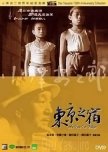
"Human beings have the best of times as kids who know nothing"
A desperate father traversed a dusty road outside of Tokyo searching for work during the Depression in An Inn in Tokyo. Ozu Yasujiro held back nothing in this his final extant silent film. Regardless of the lack of sound, this tender and tragic story of parents struggling to provide the basic necessities of life for their vulnerable children was emotionally compelling.Kihachi and his sons, Zenko and Shoko, carry their meager belongings in one small pack. Most days they must choose between eating or shelter. If they are lucky, they can turn stray dogs in for 40 yen. In a sprawling industrial complex, Kihachi is unable to get past the front guard to even apply for a job at one of the factories. He and his boys meet a widow and her young daughter who are in the same dire straits his family is, maybe worse. Otaka is looking for work, but as a woman, there are few available options. Late one night when Kihachi and the boys have nowhere to go but under an awning in the pouring rain, an old friend appears and takes the bedraggled family in. She helps Kihachi find a job and provides a room for them. Only a thin line stands between them and disaster or happiness.
This film was fairly realistic about the time of economic calamity. It was heartbreaking watching Kihachi and his sons mime eating their favorite meal and drinking sake on painfully empty stomachs. A father having to make the choice of whether to feed his children or provide shelter for them for the night was cruel. Zenko made a foolish choice of purchasing a hat with money he made that could have fed them. His father berated him but then turned around after being hired and spent money on sake. In the desolate fields, Kihachi and Otaka marveled at their children’s resiliency in an endearing moment as the kids developed an instant bond while playing. As Kihachi’s affection for Otaka grew, he assumed she would find respectable work as he did, though his good fortune was aided by an old friend and the benefit of being male. When tragedy inevitably struck both Otaka and Kihachi made devastating sacrifices. “Thus has a soul been saved.” Saved, maybe. But the future of the children was put into further emotional and financial jeopardy. Which further illustrated that people pushed to the edge of survival will do things that might seem immoral, especially when a parent is protecting a child.
Even though Ozu refused to have sound and spoken dialogue, the studio insisted on a musical score. The instrumental music was mournful and a touching addition. Dusty fields outside the factories provided a hopeless wasteland threatening to swallow the destitute wanderers made all the more surreal as children played among the industrial equipment. Sakamoto Takeshi as Kihachi, Aoki Tomio as Zenko, and Iida Choko as Otsune performed in numerous Ozu films and gave strong performances here. Ozu constant, Ryu Chishu, also made a brief appearance in a bit part.
Ozu painted a bleakly realistic picture of poverty and despair with moments of hope and sunshine often provided by the children. He also had his characters illustrate that despite the bleakness of their existence there were still opportunities for heartfelt kindness, laughter, and generosity. If you enjoy the films of Ozu Yasujiro or quality silent films, this is one to try.
5 April 2024
Was this review helpful to you?

"You've gone too far!" "We'll go further!"
The Shaolin Kids had neither kids nor anything Shaolin in it. For a 1970’s Taiwanese martial arts flick it had a larger budget and cast than usual. While the sets may have been more primo, the unwieldy cast and convoluted plot made it difficult to slog through at times.Prime Minister Hu Wei Yung is plotting to overthrow the emperor and has a message for his allies detailing his treacherous plan. He’s been eliminating opponents by various methods, most recently by poisoning Liu Hsin Erh’s father. She’s looking for payback but General Lu stops her. Lu is part of a group aware of Hu’s duplicity and is working to bring him down. Liu manages to get her hands on the secret message, but from there the list has a rocky passage on the way to the Imperial Court.
Shaolin Kids had a strong cast. Polly Shang Kuan Ling Feng played the avenging daughter. Tien “Roc” Peng and Chang Yi played son and father, although both were born in the same year! Carter Wong, in a really bad wig, had a supporting role as one of those loyal to the emperor. He appeared and disappeared throughout the movie. One look at the cast list and it was apparent who was going to be the Big Bad, Yi Yuan had no problem playing the rebellious prime minister.
Generally, the fights were routine, utilizing swords as well as fists and kicks. Polly is always entertaining but the fights weren’t exceptional. The most interesting pairing was the Cliff Lok and Huang Fei Long “Light and Dark” evil duo. The two had their secret move of “Heaven and Earth” where one went high and the other attacked low. The heroes who fell prey to it had never learned to duck or side step to their detriment. Chang Yi and Carter Wong didn’t have much to do but managed to make their fights with the evil duo more entertaining than some of the other combatants. Tien Peng seemed to be an afterthought both in fights and plot.
The Shaolin Kids suffered from poor editing and transitions in narrative as well as a ridiculous title. There was a lack of focus and clarity in the storytelling and the fights weren’t much better. This film wasn’t bad, it was just underwhelming.
29 March 2024
Was this review helpful to you?
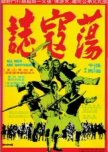
Along the lines of “I heard there was a secret chord that David played and it pleased the Lord,” David Chiang’s character plays a tune for the Emperor of Song. The emperor is so taken with his music that he declares he will pardon the Heroes of Liangshan if they can destroy the rebel Emperor Fang La. The heroes begin their quest with great success but also at a great cost. Finally, all that is left is to breach Fang’s fortress walls and bring him down. After a failed attempt, a Fellowship of the Sword is assembled with Yan Qing, Black Whirlwind, Tattooed Dragon, Fearless One, White Stripe, Sun Er Niang, and Zhang Qing. The seven heroes enter the fortress in order to spy on their enemy and determine how to help the Liangshan army get through the gates. Black Whirlwind, whose heart is bigger than his brain, starts a domino effect that results in tragedy.
As short as The Water Margin was on action and death, All Men Are Brothers was long. The film kept the swordplay coming though it began to follow a repetitive and predictable pattern. The same four fight choreographers worked on this film-Tang Chia, Lau Kar Leung, Lau Kar Wing, and Chan Chuen. The fights were much better in this film, at least most of them. David Chiang’s wrestling moves still made very little sense to me. Chen Kuan Tai’s fight used a variety of weapons and moves and as usual, he knew how to sell them. Bolo made an appearance as an evil general decked out in a leopard caveman shirt. Poor Black Whirlwind learned the lesson, “never play another man’s game” too late during their fight. There was also a fight in deep water with swimmers against warriors with spears in boats that appeared inherently dangerous for those involved.
Fan Mei Sheng dominated every scene he was in with his enthusiasm. He all but said, “Hulk smash!” as he gleefully swung his axes in battle. Chen Kuan Tai was able to join the fun in this film after being sidelined in the last, just like Danny Lee. Ti Lung still had very little to do until the end and was still in that awful wig. Though they kept trying to focus on David Chiang’s character, I found his performance uninteresting. The last two of the seven were bland and barely registered though I was happy a woman made the team. Ku Feng once again played Welcome Rain, a leader who felt the loss of each warrior serving under him.
The sets were enormous for the keep, though not as intricately designed as The Water Margin’s sets, it was above and beyond normal SB fare. Shaw Tower, the famous pagoda, made a cameo appearance in this film for an early battle. Once again, the cast of extras was quite numerous. Thankfully, the awful contemporary music from the first film was replaced with a more organic sound. The ‘chicka-chicka-chow’ Shaft effect was still used around David Chiang’s character though.
All Men Are Brothers lacked the subtlety of its predecessor with bodies covered in #2 red finger paint and dropping like flies. Perhaps it was more realistic to paint the cost of war in blood. Or it could have just been Chang Cheh being Chang Cheh. As always, I grade these older niche films on a curve.
28 March 2024
Was this review helpful to you?
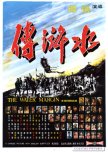
When Brother Chao is killed by The Golden Spear, the Liangshan gang of righteous outlaws vows revenge. The only problem, Shi Wen Gong is too tough for any of their fighters to confidently defeat. Timely Rain decides they should call upon the Jade Unicorn and The Prodigy to take him down. Two of the members attempt to trick Lu Chun I into helping them but he sees through them with the aid of Yen Ching. Before he can send the two outlaws home, his adulterous wife and her lover set him up with the corrupt Grand Secretary Liang. While everyone escapes, Lu is captured. The Heroes of Liangshan won’t abandon an honorable man who is suffering because of them and the race is on to save his life before he is executed.
This synopsis sounds interesting and it was once the story got rolling, but it was a tediously slow start. The movie spent 12 minutes briefly introducing characters-27 of them! But that’s not all! The introductions kept going. I counted 46 actors introduced as important characters. It could make the mind reel, especially since most of the heroes don’t show up again until briefly at the end for the final fight. Despite the number of characters, the primary focus was on Lu and Yen Ching. Welcome/Timely Rain, Clever Star, Black Whirlwind, and the Fearless One were also integral to the story. Leopard Man/Lin Chong had fights at the beginning and end of the movie.
David Chiang as The Prodigy was an interesting choice. He has legions of fans, I have just never warmed up to him much in these old films. His fights were underwhelming. Yen Ching’s ability meant he barely touched men and they flipped through the air which seemed odd coming from such a slight actor. The stuntmen earned their money twirling and flopping from what looked like imaginary contact at times. Tamba Tetsuro was far more intimidating as the Jade Unicorn. Ku Feng as Timely Rain was truly welcome for me, he’s one of my favorites. Wang Chung threw himself into the energetic role of Fearless. The final fight pitted five of the heroes and their different styles against five of Shi Wen Gong’s men. The two Japanese actors, Tamba Tetsuro and Kurosawa Toshio also had their chance to face off. For 1972, the fights weren’t bad. Some were clearly better than others and more realistically gory.
Shaw Brothers opened up their check book for this film. The cast of stars may have been large but the cast of extras involved was huge. There were three directors and two assistants (John Woo and Godfrey Ho) along with four fight choreographers.
The sets were massive and the costumes were unique for the different characters although poor Ti Lung had a laughably bad outfit and wig. The biggest drawback for me was the soundtrack. It was wildly anachronistic, synthetic music sounding like it came off of a 1970’s US cop show with hints of Shaft and Clint Eastwood westerns thrown in. Somehow if didn’t match up to this ancient story. And story is what this movie had going for it once it actually started. Unlike the hundreds of thinly plotted kung fu films churned out by Shaw Brothers and Golden Harvest, Water Margin had layers of story within it. There were times it could be repetitive, the Jade Unicorn was rescued and captured several times and the Heroes of Liangshan weren’t always well coordinated in their efforts which nearly led to tragic events. It also seemed pointless to spend so much time introducing the heroes when most of them were never seen again or only briefly at the end of the movie.
If you go into The Water Margin with the understanding that most of the characters in the lengthy introduction will have little to no screen time, it will help. The focus was on Lu being wrongfully charged with a crime and the efforts to clear or rescue him with the revenge against Shi served up for dessert. Though this was epic for a Shaw Brothers production, it will still only be of interest to fans of old martial arts movies or maybe those fans of the novel.
28 March 2024
Was this review helpful to you?
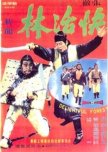
Day drinking with The Tiger Killer
The Delightful Forest is one of the Shaw Brothers films that has been restored and it looked good. Shaw Brothers put forth the money for nice sets and costumes. Ti Lung was young and athletic, always a plus. So why waste Ti, watching him drink and eat more than fight? Apparently, the movie did follow the book, The Water Margin, regarding this part of the Tiger Killer’s life, so maybe that’s what the legendary strong man spent his time doing. I'll leave it to the readers to decide.Legendary Wu Sung who killed a tiger with his bare hands comes to town with blood in his eye after discovering his sister-in-law and her lover murdered his brother. In quick order he kills the murderers and turns himself in. On the way to prison he fights The Witch who owns an inn and then becomes sworn brothers with her shirtless husband. At the prison, the chief warden’s son has plans for him. Golden Eye wants Wu to defeat Jiang Zhong who has taken over The Delightful Forest, a village of inns, brothels, and casinos that had been paying Golden Eye tribute. What Wu will find out is that Jiang has powerful friends who also want control of the Delightful Forest.
“When people are drunk, the world and time don’t exist”
Ti Lung seemed to be having a lot of fun playing the cocky, heavy drinking, and heavy hitting Hero Wu. I’ve never seen him so light-hearted in a film. Wu drank on the way to prison, he drank in prison, and he stopped at the 12 places on the way to fight Jiang to drink 3 large bowls of wine at each. He drank heavily at the bad guy’s lair. This wasn’t even drunken kung fu fist, apparently the booze powered him up even when he wasn’t fighting. However, like Sampson, he stupidly told the bad guy the secret to beating him.
There were few significant fights and most were over quickly. The rest of the time Wu spent eating and drinking. It took 52 minutes before Wu had drunk enough to meet Jiang in a quick battle in the town center. One of my favorite fight choreographers, Lau Kar Leung was one of four on this film. There didn’t seem to be enough fights to warrant that amount, but Tang Chia, Lau Kar Wing, and Chan Chuen all contributed. Some of the most impressive fights were the ones with Ti Lung wearing a cangue. Even if it was made out of Styrofoam or a lightweight material, the awkwardness of it seemed like it could have been highly problematic to work around and not get injured engaging with various stuntmen. Right before one of these fights they showed Shaw Tower, the pagoda Cheng Pei Pei had to climb in Lady Hermit (1971). The pagoda made cameos in many SB films and I’m always on the lookout for it. The final rampage was impressive but lasted all of 9 minutes and there were some serious editing issues with it. This was a Chang Cheh film which meant there were buckets of blood in those final minutes.
If you want to see the live action version of this part of Wu Sung’s life you might really enjoy this. I felt like the only sober person at the party. Wu Sung’s drinking just wasn’t very interesting to me. When they finally let Ti Lung loose, the fights were good and he was quite charismatic. The Delightful Forest falls in the slightly below average category for me from this time period and genre, more like the Drunken Forest.
27 March 2024
Was this review helpful to you?
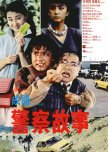
Sgt. Chan Ga Kui is part of a sting operation on drug cartels having a meeting in a shanty town. They are particularly after Boss Koo and his gang. After destroying most of the squatters’ village, and a spectacular rundown of an escaping bus, Chan slaps the cuffs on Koo and becomes a local hero and is used for recruitment. Superintendent Li decides to use Koo’s secretary, Salina Fong, as a witness, which puts her life in jeopardy. Chan is ordered to be her bodyguard. From then on, the case and Chan’s life take a turn for the worse.
I enjoyed the first third of this film and the last third. The middle third dragged badly for me. There was a long “comedic” scene with his girlfriend. A painfully bad trial scene. And then another comedic scene where a woman who had been raped and a woman who was being beaten by her husband were completely ignored during a phone gag. I also had to remind myself that the beautiful and talented Maggie Cheung was paying her dues in the thankless, idiotic girlfriend role.
The stunts were phenomenal for the time. The umbrella and bus stunt, numerous fights involving sugar glass, and the final stunt with Chan in a mall sliding down a tall pole surrounded by draping lights were leaps and bounds beyond the status quo in 1985. They were also inherently dangerous. Chan was injured twice during filming. Brigitte Lin even stepped up and was thrown through a table and also a plate glass window. Few movies unless they were filmed in a glass factory would have more people shattering glass with their bodies. Proof also that movie glass is magical as no characters were badly cut despite all the bodies bouncing off the huge panes and shattered pieces of translucent blades.
Police Story broke new ground for fighting and action stunts even though the story did not. Chan’s athleticism and flexibility was a thing of wonder. My rating is based on the astonishing stunts at the beginning and ending of the film and also on my pre-1990’s grading curve.
25 March 2024
Was this review helpful to you?

 37
37 112
112 7
7





















